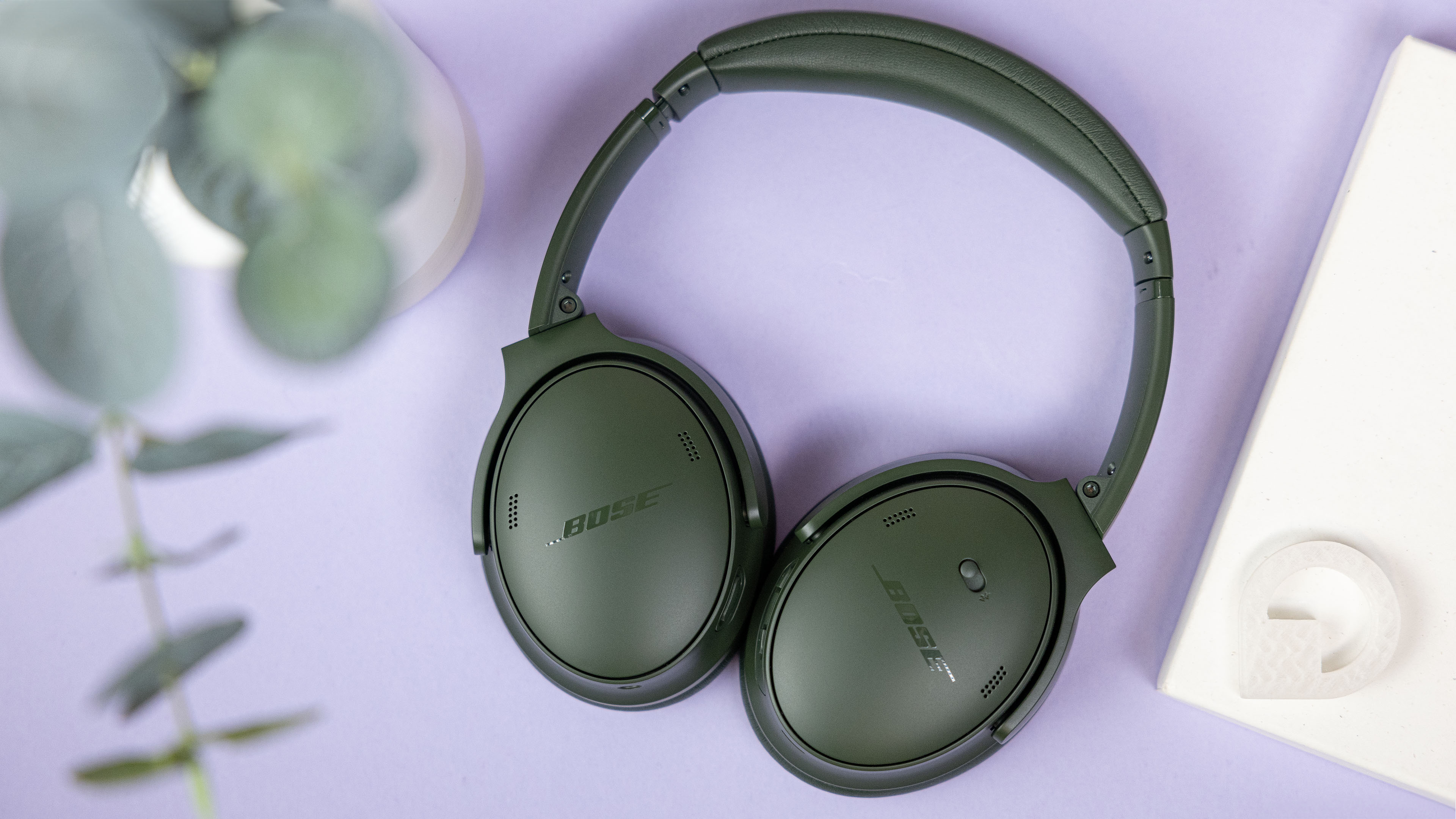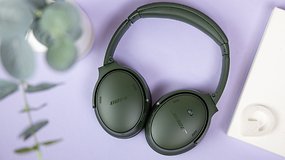
[ad_1]

The Bose QuietComfort Headphones will replace the aged stalwart among wireless Active Noise Cancellation headphones, the Bose QuietComfort 45. Priced at $279 a pop (on discount from its $349 MSRP), these Bluetooth headphones are Bose’s entry-level headphones. Is the price tag justified? Just how good is the audio quality, Active Noise Cancellation, and battery life of Bose’s new headset? I will tell you all about it in this full review.
Summary
Buy
Bose QuietComfort Headphones
Good
Good audio quality
Very good Active Noise Cancellation
Good battery life
Very comfortable to wear and easy to carry
Multipoint Bluetooth connectivity
Auto off mode
Spotify Tap
Bad
No IP certification
No wear detection
No HD codecs supported
A little too expensive
Bose QuietComfort Headphones: All deals
The Bose QuietComfort Headphones in a nutshell
The Bose QuietComfort Headphones have been available since 2023 for $349 a pop. Fortunately, since its launch, this pair of Bose headphones have seen a price reduction and is now available for $279 on Amazon or the Bose store.
It replaces the Bose QuietComfort 45, the stalwart that has been released many times over. It is less premium than the current flagship, the Bose QuietComfort Ultra Headphones (review) which retails for $379and replaces the Bose NHC 700 (review).
Design
The Bose QuietComfort Headphones are one of the most comfortable wireless headphones I’ve worn for long sessions. It’s also highly portable, with foldable earcups. They’re ideal if you’re a frequent commuter or traveler but not much has changed from the previous model.
Pros:
Fairly premium finish and materials.
Very comfortable to wear.
Easy to carry with foldable earcups.
Efficient physical buttons.
Cons:
The Cypress Green color of the Bose QuietComfort Headphones is rather attractive. / © nextpit
Bose resists the recent trend for headphones that are not foldable, and that’s a very good thing indeed. The Bose QC Headphones can be folded at the hinges connecting the earcups to the headband. It’s highly portable.
The plush leatherette earcup cushions and headband are very soft. The Bose QC Headphones are, without a doubt, the most comfortable wireless headphones I’ve worn in a long time over lengthy listening sessions.
I also like the fact that the controls comprise physical buttons as opposed to touch-sensitive ones. The headphones can be used passively, i.e. plugged in via the included 3.5 mm to 2.5 mm audio cable. You will not get to listen over USB-C though, and that’s a shame for a high-end headphones that’s supposed to tout modernity.
The headphones comes in four colors: Black, White Smoke, Cypress Green, and Moonstone Blue. I found the Cypress Green variant of my review unit to be very attractive. Overall, the design of the Bose QC Headphones feels premium. I regret not seeing an IP certification for water and dust resistance.
The earcup cushions on the Bose QuietComfort Headphones offer very good passive noise isolation, and are sized to fit larger ears. / © nextpit
Audio quality
The Bose QC Headphones may cost $279, but the audio quality remains pretty basic as with Bose products most of the time. No HD codecs are supported and there is no Hi-res certification here. The Bose audio signature remains very good and will suit most users who are accustomed to streaming MP3s in AAC.
Pros:
Classic but effective V-shaped audio signature.
Good stereo imaging, immersive sound for movies.
Cons:
I like Bose’s physical controls, they’re classic but effective. / © nextpit
Bose makes do with the basic SBC and AAC codecs for Bluetooth audio streaming. Technically, this means you can listen to tracks with 16-bit depth, at a 44.1 kHz sampling rate, and a maximum bit rate of 256 kbps. This translates to lossy compression, which is something purist audiophiles detest.
That’s what most manufacturers offer anyway. For my review, I used Apple Music with the audio quality set to “lossless”. I don’t have a frequency response meter (yet!), but the Bose audio signature is very well-known. It’s a “V” signature, which basically means Bose increases both bass and treble higher than the mids to provide the impression of a more detailed sound.
While it is not a very neutral audio signature, but it remains broadly in line with the expectations of the vast majority of users. If you prefer a more neutral profile, you can always turn down the bass and treble via the three-band equalizer in the Bose Music application.
The headphones are also responsive, with various sounds flowing dynamically and cohesively together, while the stereo scene also seemed quite wide to me. I particularly enjoyed watching movies and TV series with these headphones.
The Bose equalizer is not very precise, but there are enough presets to work with. © nextpit
Active Noise Reduction (ANC)
The Bose QC Headphones feature Active Noise Cancellation (ANC). It works very well as always with Bose, and is also rather customizable. As for the transparency mode, I found it to be very natural.
Pros:
Good attenuation for structure-borne noise.
Very natural transparency mode.
Possible to create modes by adjusting the ANC intensity.
Cons:
ANC or transparency mode is always active.
Human voices are not sufficiently filtered by the ANC.
You can use the Bose QuietComfort Headphones passively (wired) via the audio cable, but Bose doesn’t offer audio via USB-C. / © nextpit
Bose is the Active Noise Cancellation specialist. Admittedly, Apple and Sony have made huge strides in this area with the AirPods Max (review) and the Sony WH-1000XM5 (review). However, Bose remains one of the best reference points in the field, if not the best.
I found the Bose QC Headphones’ Active Noise Cancellation to be very good. Solid-borne noise, which is a little low and constant, is almost completely attenuated. This is great when you’re on the move and want to cut yourself off from the world.
However, Bose really struggles with more airy, fluctuating, high-pitched noises, such as human voices. I could distinctly hear my colleagues when they chatted with each other in the open space of our office.
The transparency mode, which amplifies ambient noise, felt very natural to me, and that’s a good thing. I found the voices to be particularly clear without any hiss or distortion.
I also appreciated being able to create my own noise reduction mode. You can manage the intensity of the ANC incrementally. Being able to adjust the reduction in real-time also makes it easier to realize how much it attenuates ambient noise.
You can create two custom Noise Cancellation modes and adjust the ANC intensity. © nextpit
You can easily switch between Active Noise Cancellation, transparency, and custom modes. © nextpit
Features and applications
The Bose QuietComfort Headphones is compatible with the Bose Music application. This is available as a free download on Android and iOS, but you need to create a Bose account to use it. The settings aren’t very advanced, so do not expect the moon and the stars.
Pros:
Comprehensive physical controls.
Equalizer is present.
2 custom modes for noise reduction.
Auto off mode.
Multipoint Bluetooth connectivity.
Cons:
No wear detection.
Equalizer is not precise enough.
No 360° audio (not really a flaw in my opinion).
Most of the features I’d expect from high-end headphones are there, apart from wear detection. The Bose QC Headphones don’t automatically pause music when you remove them. Fortunately, Bose does offer an automatic sleep mode, so you don’t risk draining the battery if you forget to turn it off.
The interface of the Bose Music application is highly refined, but you will need a Bose account to fully maximize it. © nextpit
Bose leaves little room for adjustments but the essentials are there. © nextpit
Another feature that Bose skipped was 360° audio. This function is reserved for the Bose QC Ultra Headphones. I do not find this function to be very useful anyway. Bose’s solution, dubbed Immersive Sound, didn’t really impress me.
The three-band equalizer has the merit of being present, but I would have liked a little more adjustable options. You can easily switch between noise reduction, transparency, and have up to two custom modes.
You can pair the Bose QC Headphones with two devices simultaneously time using multipoint Bluetooth connectivity. © nextpit
The shortcut button on the left earcup of the Bose QC Headphones lets you know the battery level or activate Spotify Tap as desired. © nextpit
There is no wear detection in the Bose QC Headphones, but we still have an automatic sleep function to preserve battery life. © nextpit
The Bose QC Headphones supports Multipoint Bluetooth connectivity. You can pair it with two devices simultaneously and it works very well. The physical controls are also well thought out. If you’ve owned a Bose QC 45, you won’t feel out of place.
Volume + button(right earpiece)
Play/Pause button(right earpiece)
Volume – button(right earpiece)
Action button(left earpiece)
Single tap
Increase volume
Play/Pause, pick up/hang up incoming call
Lower volume
Change mode (ANC, transparency, custom)
Double tap
–
Next track
–
Mute call
Triple tap
–
Previous track
–
–
Long press
–
Reject incoming call
–
Shortcut (battery level or Spotify Tap)
Battery and recharging
The Bose QuietComfort Headphones boasts a battery life of 24 hours with Active Noise Cancellation enabled. ANC or transparency mode are always on anyway. This is a very average score for such an expensive pair of headphones. Sennheiser and Sony do much better in this price range.
Pros:
Average battery life, but sufficient for most people.
Auto off mode to preserve battery life.
Cons:
Takes a long time to fully charge.
I mainly used the Bose headphones in the office, on my eight-hour workdays. I never turned the headphones off as soon as I took them off for an extended period, but I had set the auto-off mode activation to 5 minutes of inactivity. I also used the headphones at home, on my commute home for a few hours. I also manually turned it off before retiring for the night.
The Bose Quiet Comfort Headphones neatly folds inside the carrying case. / © nextpit
Based on this usage pattern, I was able to last three days before having to plug in the headphones for a recharge. The promise of 24-hour battery life is kept. It took me just over 2 hours to fully charge the headphones. According to Bose, a 15-minute charge offers enough battery life for another 3 hours of listening.
As long as you ensure the activation of the automatic sleep function, this should be more than enough for most users.
Technical specifications
Technical specifications
Device
Image
Design
Circum-aural | weight 240 g | No wear detection | Physical controls
Audio
40 mm drivers
Frequency response
10 – 20,000 Hz
ANC
Yes, always active
3 microphones per headset
Transparency mode
Bluetooth
5.1 | codecs SBC, AAC | Multipoint
Battery life
24h with ANC
Quick recharge 15 min = 3h autonomy
0 to 100% in 2h30
Price
$279
Conclusion
Would I advise you to buy the Bose QuietComfort Headphones for $279? Yes, especially if you were reluctant to purchase the more expensive Bose QuietComfort Ultra Headphones (review).
Affiliate offer
Not only does the non-Ultra version cost $100 less, but you only lose out on 360° audio and support for the aptX Adaptive codec. If you’re looking for high-end wireless headphones with great Active Noise Cancellation that are easy to carry and super-comfortable to wear, the Bose QuietComfort Headphones is a great choice.
Audio quality isn’t the best in the market nor is the battery life. At this price, there are better choices from Sony and Sennheiser. However, if you want a fuss-free, plug-and-play premium headphones to stream MP3s over Spotify, I can recommend this model from Bose.
What do you think of the Bose QuietComfort Headphones after this in-depth review?
Bose QuietComfort Headphones
To device database
[ad_2]






